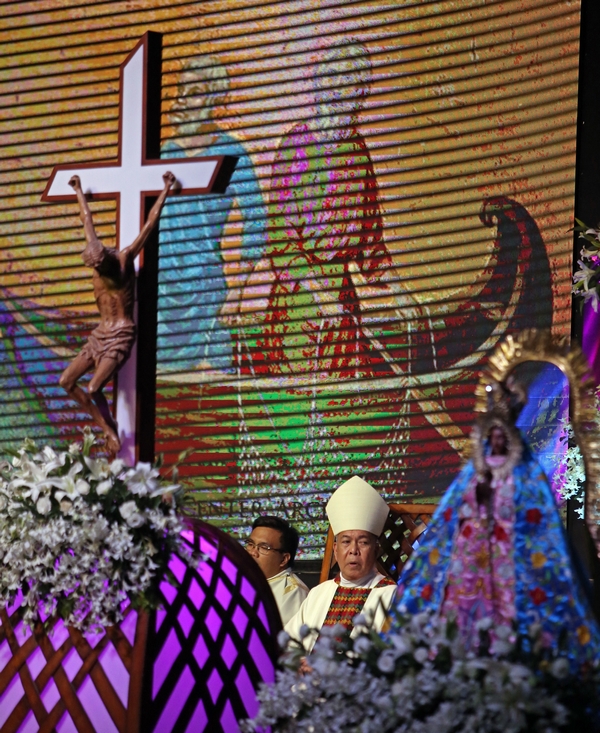The Catholic Bishops’ Conference of the Philippines (CBCP) on Monday called on all Filipinos to give the proposed Charter change more thought while asking legislators to set aside self-interests and to instead promote the common good.
The collegial body of bishops, led by its new president, Davao Archbishop Romulo Valles, issued a set of moral guidelines to help people discern and decide on the issue of amending the provisions of the country’s basic law.
“We call upon you, dear people of God, to form or reactivate circles of discernment and use your freedom as God’s children to discern, participate, discuss, and debate. Have an informed conscience and decide in the light of Gospel values. Do what is necessary. Persuade our legislators to do only what is genuinely for the good of all on this issue of Charter change,” said Valles in a statement issued on the last day of the CBCP Plenary Assembly at the Oakridge Pavilion in Mandaue City.
At least 85 bishops from different parts of the country participated in the three-day plenary that began last Saturday.
Also present at the gathering was Manila Archbishop Luis Antonio Cardinal Tagle.
In its statement, the CBCP reiterated what has been its stand on proposals to change the 1987 Constitution.
“On the matter of changing the 1987 Constitution, the CBCP has declared its moral stand not only once but at least five times since 1987. We began with a moral judgment in 1986 declaring that, though imperfect, the provisions of the draft 1987 Constitution were consistent with the Gospel,” the bishops said.
They said amending the fundamental law of the land, which was “crafted for the common good after years of dictatorship,” requires widespread peoples’ participation and consultation, unity of vision, transparency, and relative serenity that allows for rational discussion and debate.
The Church’s highest governing body said any laws of the country must promote and defend human dignity and rights—principles that correspond to Christian values based on the Gospel and are present in the 1987 Constitution.
“Given present developments and trends in legislation where pro-life principles are even now being undermined, we are deeply concerned that such principles, which are consistent with the fundamental nature of marriage and the family, and which are now enshrined in the 1987 Constitution are most likely to be overturned,” the CBCP said.
When moves for Charter change calls for “no elections” and pushes for extension of terms of office, the bishops said it is to be expected that citizens would react with suspicion, astonishment and exasperation.
“This moral principle requires total transparency and accountability, clarity and purity of motives. Participation is at the heart of democracy. Clearly, a move for Charter change that involves transforming the Congress into a Constituent Assembly is bound to be deficient of widespread peoples’ participation, discussion, and consultation,” the CBCP said.
“It would be totally rash for members of Congress to presume the reasoned approval of their constituents on so grave an issue as the move to overhaul the nation’s Charter. Apparently, the intention of some legislators to revise the 1987 Constitution might indeed be the common good. But lack of participation, lack of transparency, as well as perceived promotion of self-interests contravene this intention,” it added.
The administration of President Rodrigo Duterte is pushing the shift from a unitary to a parliamentary form of government in various shapes that would govern federal states.
If the Constitution is to be revised at all, the CBCP said the process should lead to a greater defense and promotion of the above-mentioned moral values of human dignity and human rights, integrity and truth, participation and solidarity, and the common good.
As servant leaders, the bishops said they have listened to people who believe that the solution to the country’s problems is not a revision of the Constitution, but a full implementation of the 1987 Constitution, and a revision of the Local Government Code, originally designed to devolve power from central authority, following the moral principle of subsidiarity.
“We have also heard the views of those who believe that the solution we seek is ultimately the transformation of our political culture, the eradication of a political mindset of personalities, pay-offs, and patronage – a culture that is entrenched in our present political structures and practices. Without conversion of mindsets, the new political wine of Charter change will remain in old political wine-skins, and merely end up bursting the hope for a new political culture,” the CBCP stressed.
This is the second time that the proceedings of the CBCP was held in Cebu since the CBCP was established in 1945. The first time Cebu hosted the Plenary Assembly was in 2016, just days before the 51st International Eucharistic Congress.
The CBCP Plenary Assembly is held every January and July.
